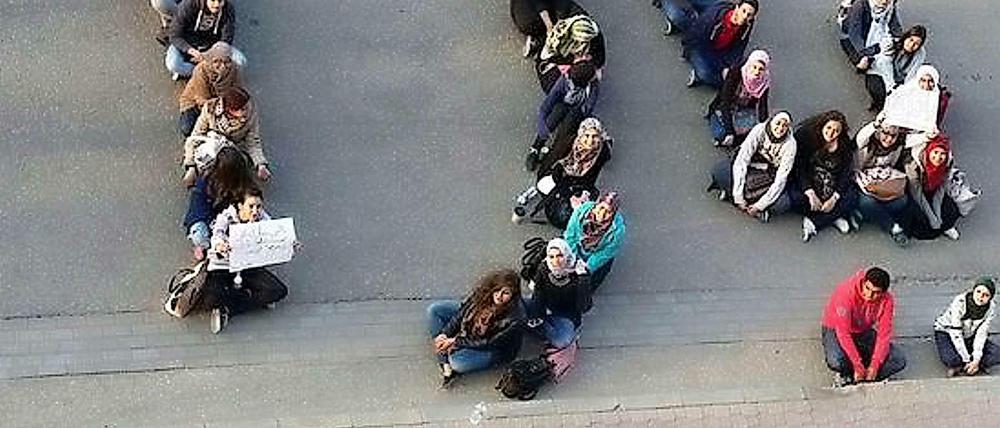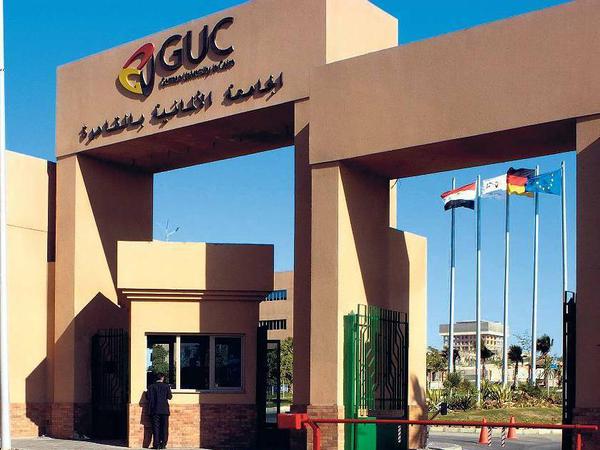
© GUC-Insider via Twitter
German University in Cairo (GUC): Egypt's Students Cry Foul
The German University in Cairo (GUC) has been criticized for expelling students and discouraging protests. The university's German partners are keeping their distance, by Mohamed Amjahid, Amory Burchard and Tilmann Warnecke.
The German University in Cairo (GUC) sees itself as a “mediator and promoter of democratic development in Egypt.” It was founded more than 10 years ago under this premise, which is still stated on the university’s website today.
GUC is the biggest university abroad that is supported financially by Germany, and it is a prestigious project for German foreign and education policies.
However, since the Egyptian revolution in January 2011, things have been happening in and around the GUC that do not fit with the university’s self-image.
The president of the student union was suspended
Politically active students are being muzzled, no longer being admitted to examinations and now also thrown out. The president of the student union, Karim Naguib, was suspended a few days ago for “inciting unrest and upheaval.”
Eight other students who were also engaged in the student organization will be suspended for one to four semesters.
“The GUC prefers to have well-behaved students who only study and do not get involved,” said Nadine Kassab, 21, who was studying management at the GUC up until recently and was vice-president of the student union.
Ms. Kassab is angry with the university’s president Mahmoud Abdelkader. Since the revolution the university’s administration only wants its 10,000 students to organize themselves only for leisure activities. That has been confirmed by German sources in Cairo close to the university.
GUC believes that a university is not a place for politics
The heads of Egyptian universities, including those at the GUC, believe that a university is not a place for politics. That view has been strengthened since General Abdul Fattah el-Sisi took office as president in 2014, and in many places politically active professors and students have been dismissed and arrested.
It is not the first time that the administration of the GUC has been accused of being disproportionally harsh against students. Mass protests were triggered in 2012 by the expulsion of two students. They had demonstrated with others on campus against the Supreme Council of the Armed Forces after the death of a student during unrest in Port Said.
The GUC university council later reversed the expulsion, but insisted on the position that one “must set an example for students if something goes too far,” as the then-vice president said.
The protests were ignited by a fatal accident
The current protests were ignited by a fatal accident. In March, student Yara Tarik was run over by two of the university’s buses and died shortly afterwards from internal bleeding. Hundreds of students organised a protest with the slogan “We want to study, not die,” demanding better security measures on and around the campus.
They demanded a period of mourning for Yara, saying that teaching and testing could not simply go on when a fellow student has died due to recklessness. The activists blocked doors to lecture halls in which exams were to be held and tried to make clear to those willing to take the tests that they could not simply go on with the day’s schedule. There was a heated war of words and physical confrontation, also with the university president.
Karim Naguib, the suspended student union president, sent out a video over a Facebook chat, showing him in front of a black limousine. (The video is available here via the website of GUC Insider, a student run newspaper.) The university’s president was inside, refusing to speak to students, who wanted him to look again at the case of Yara Tarik.

© LAIF
Hundreds of students gathered quickly around the car, chanting that they did not want to be run over. President Abdelkader had to be freed from the car by his bodyguards.
No one was injured, but the incident showed just how much relations between the university’s administration and student body had deteriorated.
The students were accused of being close to extremists
There were earlier signs that all was not well. The university expelled two students, accusing them of being close to extremist groups, after two incidents. In one, back in January, the shell of an explosive device was reportedly found in front of the campus — with the demand to stop teaching. One of the students reportedly put the flag of the Islamic State (IS) as the logo on his Twitter account. The two students denied all charges against them but were jailed briefly before being released.
In reality, the charges seemed excessive. According to the Egyptian media, there was no proof that the defused explosive device was in anyway connected with the supposed demand to stop teaching.
The German community watches with dismay
And many say an IS flag in the Twitter logo of a user, proves nothing. And if some students support the Muslim Brotherhood, say critics, that does not give the unviersity the right to accuse all student representatives of extremism.
The German community in Cairo has watched events at the university with dismay. “Student engagement that had been suppressed for years at GUC found an outlet in the protests after the tragic (bus) accident, and the GUC administration handled it extremely badly from the start,” said an observer.
The charge of extremism is typical for the current situation Egypt, he said, adding that anyone who does not conform to the al-Sisi regime is accused of being close to the Muslim Brotherhood or terrorist organizations.
Around €10,000 per year in student fees.
The GUC students have long been dissatisfied with their academic conditions and the quality of instruction. They have been calling in vain for standards that were promised to them as paying “customers.” And the German University is expensive: Around €10,000 ($10945) per year in student fees.
The institution mostly attracts young Egyptians from wealthier familes, who may also be interested in improving their chances of getting a spot for post-graduate studies in Germany.
How German offices reacted to the students plea for help
Germany contributed €5 million to the development of GUC. In 2003, then German Chancellor Gerhard Schröder and then Egyptian President Hosni Mubarak celebrated the opening of the university. The German Academic Exchange Service (DAAD) - which supports members of student unions in Egypt since years -, the German Embassy and the Federal Ministry of Education and Research support the university. The universities in Ulm and Stuttgart are academic partners for GUC, and their presidents sit on the supervisory board of the university.
Students asked for support in German offices
The students have also asked for support for their issues in German offices. They reportedly were given only one piece of advice at the Cairo office of the DAAD: “Apologize to the university and the president.”
The students at the German University in Cairo have been disappointed by the “German, academic, democratic culture” that was promised to them in GUC advertisements.
The DAAD disagrees, saying that the students at the GUC did not turn to the colleagues at the DAAD office in Cairo on this issue. When asked for comment, the DAAD said it issued no advice.
A source in the diplomatic community said: “In discussions with the student representatives and the university administration, the German Embassy in Cairo promoted a solution that would protect the rights of all parties.”
DAAD "regrets" the incidents
DAAD President Margret Wintermantel “regrets” the incidents at GUC. She said the DAAD is “not indifferent to the students’ situation, even if we are not involved at all in the current conflict.” In general, the DAAD would make sure in international partnerships “that the students and other member organizations, take part in decision-making processes.” Ms. Wintermantel also said that the GUC is de jure a private Egyptian university and is largely sustained by the fees and Egyptian investments.
Neither representatives from the GUC in Egypt nor representatives from its partner universities would comment. The university in Ulm instead sent a link to the dossier from the GUC administration.
One students says: "They treat us like dirt"
In Cairo, meanwhile, the dangerous bus parking location in front of the university, where buses are often involved in accidents, has been renovated. But the students are still not happy. “There continues to be the danger that we will die there,” said Nadine Kassab. The economics student asks how it can be that so much has to be paid to a university that scrimps on safety for its students. “They treat us like dirt,” she said.
Ms. Kassab got off lightly during the expulsions because she already had received the assurance of a university spot in Munich. She is voluntarily turning her back on studies at GUC, but wants to continue being engaged for the sake of her fellow students.
This article first appeared in German in Der Tagesspiegel. Internal links are also only in German.
- showPaywall:
- false
- isSubscriber:
- false
- isPaid:
- showPaywallPiano:
- false